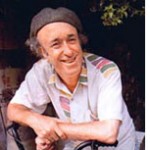By Danny Bloom

CHIAYI CITY, Taiwan — Having lived in Alaska for 10 years in the 1980s, I often browse the online newspapers in Juneau and Fairbanks from my electronic lair here in Taiwan, and the other day I came across an arresting term I had never heard of before — “botanicaust.” The newly-minted word is the title of a new sci fi novel by Alaskan writer Tam Linsey, and since I wondered if she was using the term in reference to an older word that is part of Jewish history now — ”holocaust” — I sent her a message via Facebook and asked if we could chat.
Ms. Linsey kindly said yes, and an informal email interview took place across the invisible wires of the Internet, from Alaska to Taiwan and back to the San Diego offices of this newspaper.
When I asked how she came up with the title of her novel, and if it was coined off the “holocaust” term, Linsey said: “You guessed correctly; I came up with the word by playing off the word ‘holocaust’. I love etymology — the roots of words. In Greek, the root word ‘botan’ means plant, and ‘caust’ means to burn. In Botanicaust, there is a place called ‘The Protectorate’ where the people defend their city by burning everything within a five-mile radius — plants, animals — even people.”
“I focused on the ‘botan’ prefix because the post-apocalyptic world I write about has been devastated by genetically-altered weeds, wiping out croplands and forcing people to resort to other ‘nutritional’ methods,” she added. “I went through several titles as I was writing, but I knew I’d hit the jackpot when the phrase Botanicaust came to me while I was driving.”
“Botanicaust” is a dystopian story that takes place some 400 years in the future. when the world has been destroyed by genetic engineering.
In Linsey’s narrative, the Earth has become a place, as one reviewer has already noted, ”where a few isolated outposts of civilization attempt to survive amidst a landscape of deserts and scrub weeds populated by cannibals who harvest what the description on the back cover of the book calls ‘the only crop left.’
The reader can guess what that ”crop” is: human beings! Remember, this is science fiction, so anything goes.
Linsey’s book, while not religious in tone, nevertheless delves into some important and intriguing religious issues: one character named Levi Kraybill is a resident of a small Christian farming colony known as the ‘Holdout’. The people who live there call themselves the Old Order, speak German, follow only “Gotte Wille” (God’s Will) and are patterned on today’s Amish people, according to Linsey.
What caught another reviewer’s attention was how ”deeply religious” the novel is, with the author delving into some of the main themes found in both the Hebrew Scriptures and the Christian Bible. Linsey does this with an open mind, and the characters’ search for God becomes a major part of the story.
When asked how her own religious background might have impacted the novel’s themes, Linsey said: “I do profess to be Christian, but I am not religious. Some of the things the Christian church celebrates today are actually of pagan origin, not Biblical at all. ‘Religion’ has been warped, in my view of things. I like to think of myself as more spiritual. Throughout my life, I have studied many faiths – perhaps not in great depth, but enough to know which path is, or is not, for me. I pray for guidance and wisdom often. Like Levi in ‘Botanicaust’, I think each human being needs to search for God (or the Divine, if you prefer) their own way, on a personal level.”
*
Bloom is Taiwan bureau chief for San Diego Jewish World and an inveterate web surfer. He may be contacted at dan.bloom@sdjewishworld.com